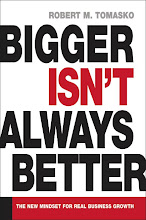December 10, 2008
Why otherwise smart executives do stupid things
[Here is Bigger Isn’t Always Better’s take on what’s behind what Steve Pearlstein wrote about in the last post.]
Why do otherwise smart, alert, and forward-thinking businesspeople repeatedly engage in activities that usually prove counterproductive?
This is a subject that has received a lot of recent attention.
Robert Sternberg, a Yale psychologist, wrote a book to answer just that question. Why Smart People Can Be So Stupid pulls together the research of several leading behavioral scientists to identify factors beyond avarice that have driven the kinds of dumb business decisions discussed in this chapter.
A Dartmouth management professor, Sydney Finkelstein, also studied this phenomenon. His book, Why Smart Executives Fail, examines what was behind 197 instances of dramatic drops in market share and value.
Nobel Prize in Economics winner Daniel Kahneman and behavioral economist Richard Thaler have also weighed in on these issues.
The findings of all these scholars share a similar theme: Mistaken perceptions of reality can cause much more damage than willful misconduct. Self-serving behaviors have certainly played a part in many unwise business expansions, but they are far from the whole story.
Link
Why do otherwise smart, alert, and forward-thinking businesspeople repeatedly engage in activities that usually prove counterproductive?
This is a subject that has received a lot of recent attention.
Robert Sternberg, a Yale psychologist, wrote a book to answer just that question. Why Smart People Can Be So Stupid pulls together the research of several leading behavioral scientists to identify factors beyond avarice that have driven the kinds of dumb business decisions discussed in this chapter.
A Dartmouth management professor, Sydney Finkelstein, also studied this phenomenon. His book, Why Smart Executives Fail, examines what was behind 197 instances of dramatic drops in market share and value.
Nobel Prize in Economics winner Daniel Kahneman and behavioral economist Richard Thaler have also weighed in on these issues.
The findings of all these scholars share a similar theme: Mistaken perceptions of reality can cause much more damage than willful misconduct. Self-serving behaviors have certainly played a part in many unwise business expansions, but they are far from the whole story.
Link
